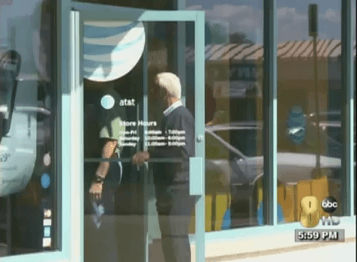
KJCT-TV caught customers lined up literally out the door of this AT&T store in Grand Junction, Colorado.
AT&T store employees in the Grand Valley of Colorado are using the company’s upgrade of former Alltel service areas to 3G service as an excuse to tell customers they need to buy new cell phones if they continue to want to use their wireless service.
Customers lined up outside AT&T stores in communities like Grand Valley, Colorado on Monday fuming over service problems than began last weekend.
“I had about an half hour wait just to find out I had to buy a new phone and they wouldn’t credit me for it or anything,” customer Josh Simpson told KJCT-TV.
AT&T employees told the television newscast the company is “getting rid of the 2G service in Grand Junction to make room for larger networks.” Employees also said customers were sent a letter informing them about the service change, but customers might have overlooked the e-mail because it looked like spam.
Local employees shrugged their shoulders as customers repeatedly complained about having to foot the bill for brand new phones, often at full price, in order to continue using their service.
“It’s a corporate decision,” one replied.
At issue is AT&T’s adopted network, acquired originally by Verizon Wireless from Alltel but spun away to AT&T as part of an agreement with federal anti-trust officials. Alltel’s network in the Grand Valley placed more prominence on its legacy 2G EDGE network than AT&T is willing to continue. AT&T isn’t actually discontinuing the 2G network — it is moving 2G service to less-favorable spectrum it owns in order to make room for improved 3G coverage. That might work fine in areas less expansive and rugged than western Colorado, but in the Grand Valley, it means many customers will find they no longer have data service at all.
The ongoing tower upgrades have also disrupted cell service generally, and when customers arrive at AT&T’s stores to complain, the employees on hand attempt to upsell them more expensive phones to “fix” the problem.
Customers calling to complain are met with busy signals or general statements from AT&T telling them the changes are for their own good. But because so many basic cell phones don’t support 3G service, upgrades to phones that do often represent a major unexpected financial hit (and another two year contract and data plan if the phone happens to be a smartphone).
“Alltel served us just fine for many years,” writes our Glade Park reader Tim. “When AT&T eventually showed up, we got everything we never wanted, and this should be a lesson for those who think AT&T will somehow ‘improve’ service at T-Mobile if they acquire them.”
AT&T customer Joan Burns told KJCT AT&T just made up her mind for her.
“I will never again sign a contract with them,” she said. “That’s bull.”
[flv width=”360″ height=”290″]http://www.phillipdampier.com/video/KJCT Grand Junction ATT Customers Forced To Upgrade Cell Phones 9-19-11.mp4[/flv]
KJCT in Grand Junction reports AT&T customers may be noticing a disturbance in their cell phone service, as AT&T employees use it as an opportunity to get customers to upgrade to more expensive phones. (3 minutes)


 Subscribe
Subscribe






